During the lesson, the information for you to know is written in regular type, and what we suggest speaking or reading aloud to children is in bold. All resources for this lesson, including the Teacher Guide, Student Page, Family Connection Card, and other resources can be downloaded in a ZIP file by clicking on the following link:
In some lessons you will find "resource articles." These are articles written by experts from around the world to help equip you for your work with children and adolescents. Share them with parents or guardians if you consider it appropriate.
But the fruit of the Spirit is love, joy, peace, forbearance, kindness, goodness, faithfulness, gentleness and self-control. Against such things there is no law.
Galatians 5:22–23
Have you ever tried to grab something just beyond your reach? Maybe you were picking fruit off a tree or trying to reach something on a tall shelf. When an item is beyond our reach, we will not get it by simply trying harder. We need help.
The same is true for resisting temptation. Think about a familiar temptation or sin in your life. Maybe you have tried to resist it, but eventually you fall short again and you experience consequences. There is good news! We do not have to resist temptation on our own. God gives us His Holy Spirit to help us. When we pray, read the Bible, and invite Jesus into every moment of our day, He makes us strong so we can resist temptation. As you prepare to teach, ask Jesus to show you where you need His strength.
Encourage family members to share with their children wisdom from their own experiences. They can tell them about a time they made a bad choice or broke a rule and what consequences they experienced because of it. What would they choose to do if they could live that experience over again?
Teacher Tip: If possible, email or text the Family Connection Card to the families of your students.
Begin by asking a volunteer to hold up an object that will not break when dropped, such as a stick, pencil, stone, or book. Ask her to let go of the object and see what happens. Of course, it will fall to the floor. Repeat this process with the other 2 objects. Point out that the consequence of letting go is that the object falls. If a child mentions gravity, help all the children understand that gravity is a force that attracts an object to the earth. Gravity is what keeps our feet on the ground. Also help the children understand that a consequence is the natural result of an action.
When you let go of something in the air, it falls.
You will get wet.
The egg will break.
All of these things are consequences of actions.
Divide the class into groups of 3 or more. Read the following situation aloud. Ask the small groups to talk about the consequences of the child’s actions. Ask 1–2 groups to share their thoughts.
I tease or bully little children sometimes. When I feel sad or angry, making someone else cry helps me forget my own pain. Last week I was caught hitting a girl 3 years younger than me. I said I was sorry to the adult who caught me, but saying I was sorry was not enough.
Whenever we make a choice, there is a consequence. If we make good choices, often there are good consequences. If we choose to do what is wrong, we usually face bad consequences. In our Bible story, we will learn that Adam and Eve made a terrible choice, and the consequences were awful.
Tell the children that you are going to read from Genesis, the first book in the Bible. Read directly from the Bible if one is available. If you do not have a Bible, the passage is provided here for you. Read it with expression.
Make the story come alive to the children. You will pause at 2 designated places within the story for children to create “frozen pictures” of a specific scene from the story. Call on different children to be a part of each scene.
Before I tell you the story from Genesis 3, listen to this important background information from Genesis 2:15–17 and Genesis 3:
Read these verses directly from your Bible.
The Lord God took the man and put him in the Garden of Eden to work it and take care of it. And the Lord God commanded the man, “You are free to eat from any tree in the garden; but you must not eat from the tree of the knowledge of good and evil, for when you eat of it you will certainly die.”
Genesis 2:15–17
Now the serpent was more crafty than any of the wild animals the Lord God had made. He said to the woman, “Did God really say, ‘You must not eat from any tree in the garden’?” The woman said to the serpent, “We may eat fruit from the trees in the garden, but God did say, ‘You must not eat fruit from the tree that is in the middle of the garden, and you must not touch it, or you will die.’” “You will not certainly die,” the serpent said to the woman. “For God knows that when you eat from it your eyes will be opened, and you will be like God, knowing good and evil.”
When the woman saw that the fruit of the tree was good for food and pleasing to the eye, and also desirable for gaining wisdom, she took some and ate it. She also gave some to her husband, who was with her, and he ate it. Then the eyes of both of them were opened, and they realized they were naked; so they sewed fig leaves together and made coverings for themselves.
Genesis 3:1–7
Show the Action Bible picture to the class if possible.
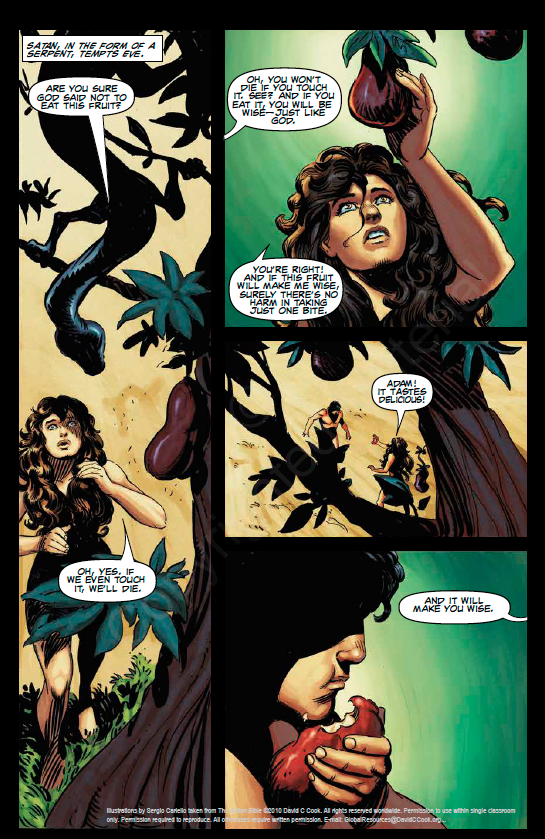
Invite 3 children to the front to create a “frozen picture” of this scene. Assign them to be Adam, Eve, and the tree. The children should stand as though someone had taken a picture of them frozen in position. Give the children several seconds to create their picture. For example, they could show Eve picking fruit from the tree and Adam is listening to Eve or eating fruit. They should use their facial expressions to show that person’s feelings. Ask them to hold their picture for several seconds while the other children observe the scene. Then lead the class in clapping for them and ask them to return to their seats. Continue the story.
Listen as I tell you more of what happened as a consequence of Adam’s and Eve’s choices.
After they had eaten the fruit, Adam and Eve felt shame, and they hid. They heard God walking in the garden, and He called to them, “Where are you?”
“I heard You and I was afraid, so I hid,” Adam answered God.
“Did you eat from the tree I told you not to eat from?” God asked.
Adam said, “Eve gave me some fruit and I ate it.”
Then God asked Eve, “What have you done?”
“The serpent tricked me and I ate it,” Eve said.
So God said to the serpent, “Because you did this, you will be cursed and crawl on your belly and eat dust. I will make you enemies with the woman. Her children and your offspring will be enemies. But one day in the future, one of her offspring will crush your head, even though you will strike his heel.”
This part I just read about the serpent and the woman is the first clue in the Bible that even though Adam and Eve sinned and broke the friendship between God and people, God had a plan that would one day heal that relationship. This verse is referring to Jesus! Satan the serpent would hurt Jesus, but Jesus, the child of a woman, would crush Satan’s head.
Now listen to the very hard consequences for Adam and Eve and all the people that have ever lived after them.
God told the woman that she would have pain in childbirth. He told Adam that he would work hard in the soil and fight with thistles and thorns. And He told both of them that they would die.
As a consequence of their sin, Adam and Eve had to leave the garden because they now knew about good and evil. God did not want them to eat from the tree of life that would allow them to live forever separated from Him. He made them clothes to wear from the skins of animals. After they left the garden, He placed huge angels called cherubim, along with a flashing sword, to guard the tree of life.
Show the Action Bible picture to the class if possible.
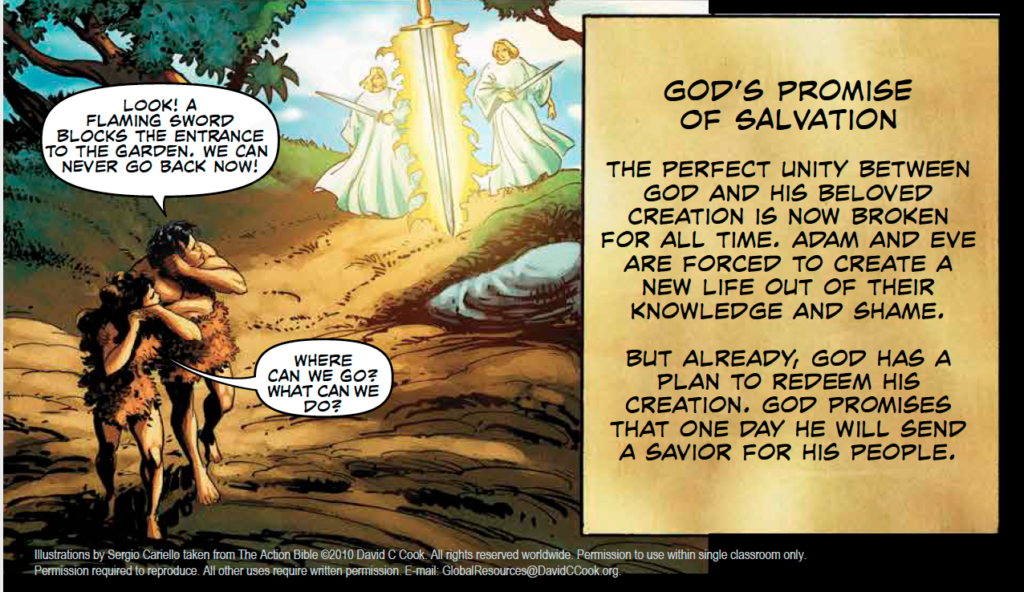
Invite 4 different children to the front to create a “frozen picture” of this scene. Assign the children to be Adam, Eve, and 2 cherubim. Give the children several seconds to create their picture. Encourage them to show what they think their character was feeling with their facial expressions. Ask them to hold their picture for several seconds while the other children observe the scene. Then lead the class in clapping for them and ask them to return to their seats. Then ask the following questions:
They disobeyed what God told them and ate from the tree of the knowledge of good and evil.
It was Adam and Eve’s choice, not the serpent’s choice.
Possible answers could include shame, embarrassed, angry, and sad.
They had to leave the garden; Adam would work hard and the ground would be filled with thorns; Eve would have pain in childbirth; they would die.
Allow the children to offer their thoughts before sharing the information below.
There were consequences for Adam’s and Eve’s actions. God told them they were wrong to disobey Him, and He disciplined them. Ouch! But here is the wonderful thing about God: When He disciplines us for doing wrong, He is not doing it because He hates us. Exactly the opposite! He does it because He loves us. He knows we will be happier and lead better lives if we follow His guidance. The Bible tells us that after Adam and Eve sinned, God made clothes for them. The Bible does not tell us what God felt, but we can imagine that He may have felt sad and disappointed. But He still loved them and cared for them.
God’s discipline is a reminder to do what is right. Never, ever forget that God loves you. He loves you when you make good choices, and He still loves you when you sin. But He always wants what is best for you, and sin always has negative consequences. God is a perfect Father, and He calls us His sons and daughters when we belong to His family.
Ask 1–2 children to answer each of the questions. Be sure to pick different children to answer each question so each child gets to respond at some point during class.
God wants what is best for us, and His way is always the best way.
He loves us and wants us to understand what is best.
It would mean that He did not really love us because He did not help us to do what is best.
Read this verse aloud directly from the Bible 3 times. Show the Memory Verse poster if possible.
My son, do not despise the Lord’s discipline and do not resent his rebuke, because the Lord disciplines those he loves, as a father the son he delights in.
Proverbs 3:11–12
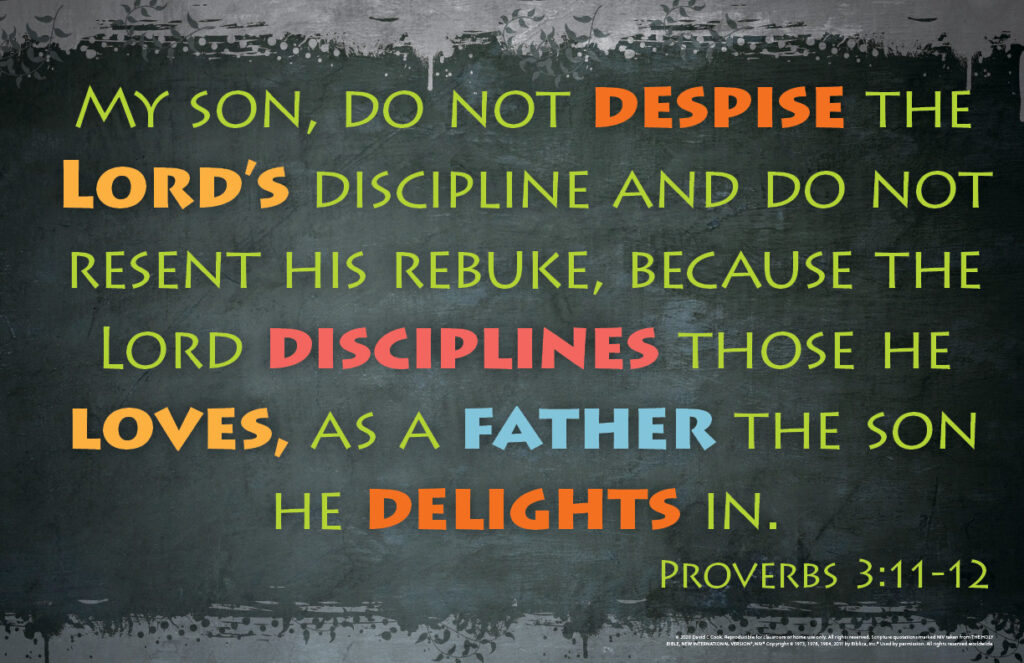
The word despise means to dislike something or someone very much. Discipline is the way God teaches us to obey His rules so we have a good life. Remember that God disciplines us because He loves us so much that He wants to protect us from bad consequences.
Ask the children to turn to a partner and say this verse in their own words. Then they should repeat it but replace “those He loves” with their own names.
Optional:
If you are using The Action Bible, allow the children to read the story on pages 21–23.
If you are using the Student Pages, allow the children time to do the activity and write the verse in their own words.
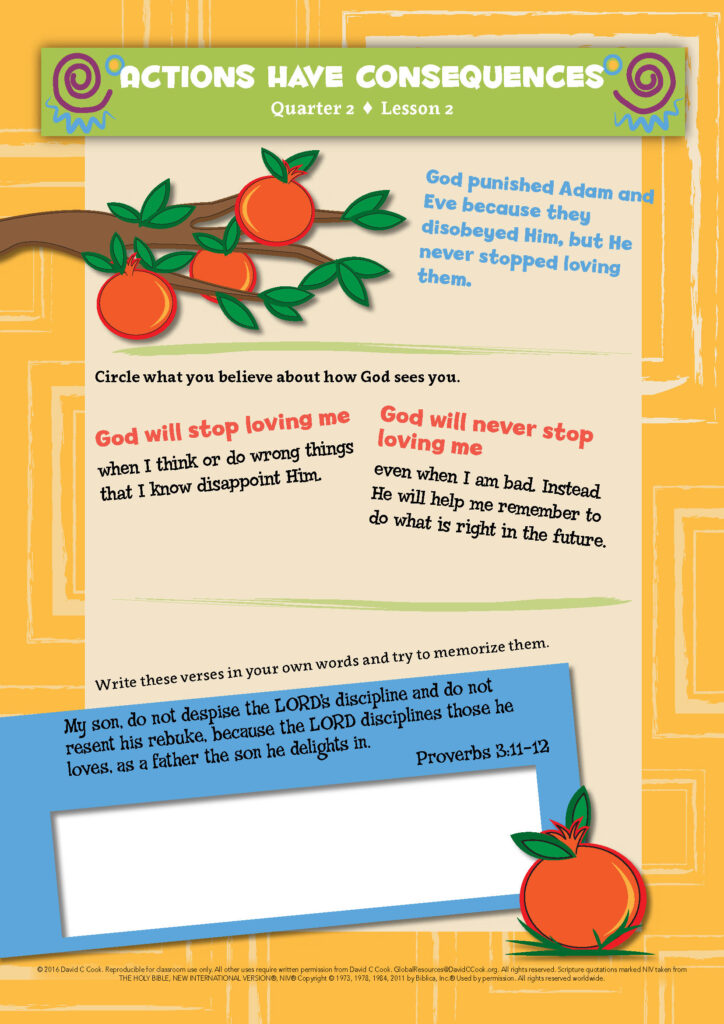
Sin is anything we do, say, or think that misses the mark of God’s best for us. It is doing things our way instead of God’s way. When we sin, God disciplines us because He loves us. He knows that if there are no consequences for our sins, we will continue to make bad choices, which will hurt others and us. But God gives His Holy Spirit to help those of us who are Christians and a part of His family.
Have the children think of a short sentence or prayer about how they want to live in a way that pleases God. They can add a gesture to go with it to help them remember. If there are children who are not Christians yet, they can think of a reminder for themselves of how they are going to try to make good choices this week. For example: “Holy Spirit, help me treat younger children kindly this week.” They can hold a hand palm-up to God and then hold 1 hand as though it is resting on the head of a younger child. Or, “I will not talk badly about my friends.” And the action could be covering their mouths. When they have finished, ask 2–3 volunteers to share their prayers and gestures.
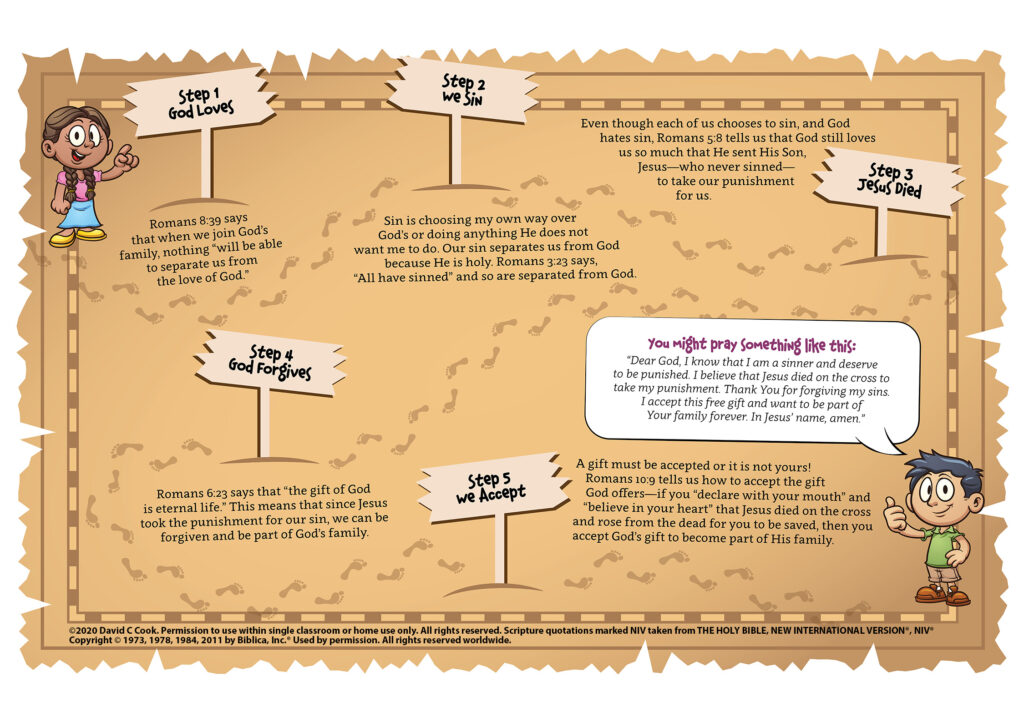
End class by praying this blessing over your children:
Blessing: Our perfect Father loves you always, and He wants what is best for you. May you ask God to help you when you are tempted. And may the Holy Spirit give you the strength and wisdom to choose what is good and right.
Lead the children in singing “Blessed Be Your Name” as a reminder that God is always with them and always cares for them.
Life on Life ©2020 David C Cook. Reproducible for home or classroom use only. All other uses require written permission from David C Cook [email protected]. All rights reserved.